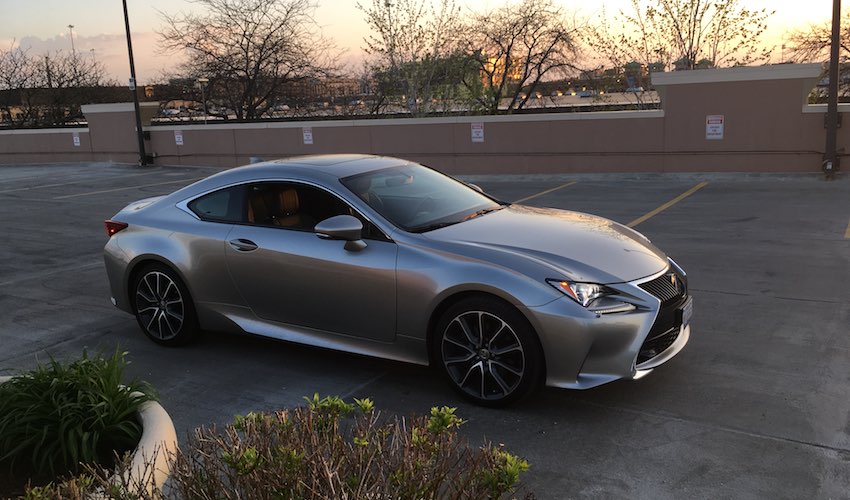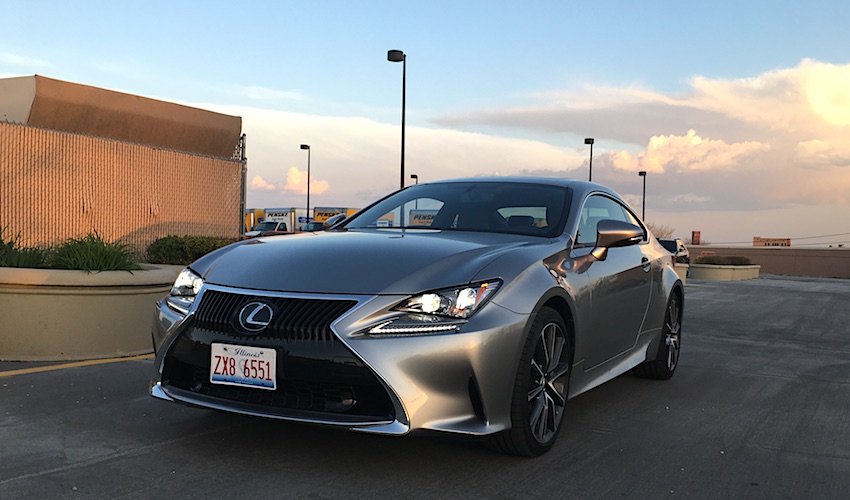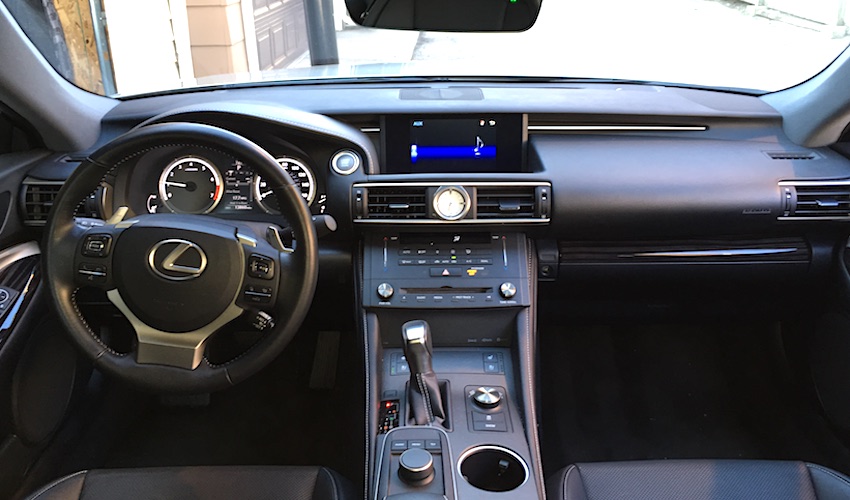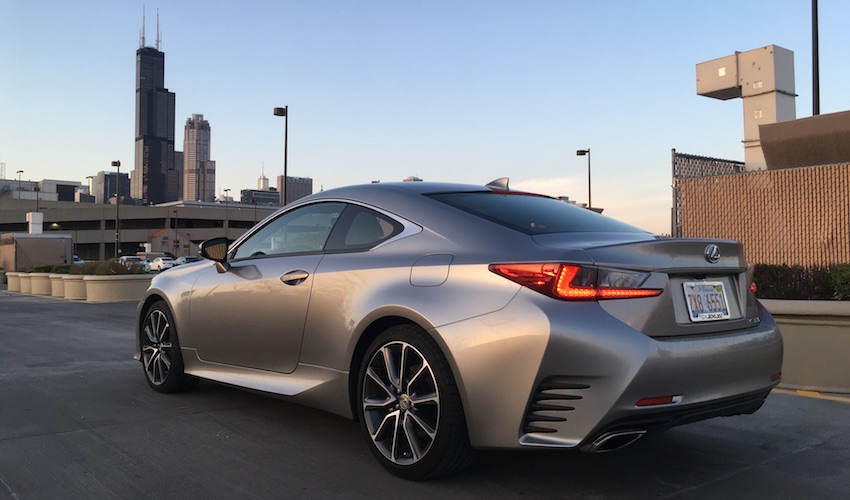
2017 Lexus RC 350
This sporty coupe brings a few practical elements to the table.
By Cherise Threewitt, Contributor, Car-ED.com | May 2018
What is this vehicle?
As Toyota’s luxury brand, most of the Lexus lineup consists of, shall we say, elevated Toyotas. They’re far from the only brand to do this, yet the family resemblance sometimes looks and feels more obvious than it does with competitors. The Lexus RC is a slight departure from the formula. It features the high safety and reliability ratings that are common with Toyota, yet the look and feel of this two-door, four-passenger, rear-drive coupe are worth considering on their own merit.
Though the Lexus RC 350 provided for this review is a 2017 model, this car carried over to 2018 mostly unchanged. However, a Wi-Fi hot spot and the Lexus Safety System+ suite of active safety features were made standard on every 2018 RC model, and V6 models (including the RC 350) gained a few more horsepower.
Who is this vehicle for?
It’s easy to describe the pros and cons of the Lexus RC 350, but piecing those perks and quirks into a sketch of a target customer is a little more tricky. For all its practical attributes — good safety test scores from the Insurance Institute for Highway Safety, reasonable fuel economy, strong predicted reliability — there are some drawbacks. The two rear seats are nearly useless, and the trunk is tiny, too. If you’re newly in the market for something a little sportier than your typical commuter car, particularly if you’re downsizing or considering adding another car to the garage, check out the RC lineup.
Why is this vehicle important to you, the buyer?
The Lexus RC stands out amongst small luxury cars thanks to its safety and reliability, according to the experts at the IIHS and J.D. Power. That makes the RC a good choice for buyers who want the look and feel of a sports car without a sports car’s common drawbacks. It also provides more refinement than many sports cars. In other words, while the RC offers plenty of power, the power doesn’t overwhelm the overall experience.

Interesting facts about this vehicle!
Rear-wheel drive comes standard in most Lexus RC models, and all-wheel drive is available, depending on trim level. Our test car was equipped with a 3.5-liter V6 engine, which produces 306 horsepower and 277 lb-ft of torque. (For 2018, the RC 350 enjoys a boost to 311 horsepower.)
The base RC Turbo comes with a 241-horsepower turbocharged 2.0-liter four-cylinder engine. Next up is the RC 300, which gets a 3.5-liter V6 that makes 255 horsepower (260 horsepower for 2018), plus standard all-wheel drive. The RC F comes in above the RC 350, with 467 horsepower from its 5.0-liter V8 engine.
Though the RC comes only with an automatic transmission (six- or eight-speed, depending on the trim level) the paddle shifters can help make the drive a little more interesting. Downshifting via paddle shifter produced instant, noticeable, satisfying acceleration.
Android Auto and Apple CarPlay are not available with this Lexus vehicle. In most cases, that would be a minor inconvenience, but the RC350’s cumbersome infotainment system (which we’ll describe in more detail) makes this point worthy of consideration.
What Impressed Us / Top Likes:
The Lexus RC 350, as tested, provided a thoroughly enjoyable driving experience, due to a combination of enthusiastic acceleration and decent agility.
It sounds pretty good for a V6.
Our test car came finished in Atomic Silver, which nicely accentuates the car’s styling and is really a sight to behold during a sunset.

Items to Make Better (Least Favorite Things):
One major gripe: the RC 350 simply would not connect to an iPhone via Bluetooth (two different, current iPhone models were tested) and the experience was extremely aggravating. According to the user manual, online forums, and a YouTube tutorial (which is way more effort than anyone should need to accomplish this task), the process to add a new device simply came to a dead end. That is, the option to pair the device never showed up. Fortunately, connecting via USB was easy, as it should be.
The infotainment system, overall, should be simplified. The dashboard, center stack, and steering wheel are all spattered with buttons and controls, many of which are redundant, and every feature in the system required several more steps than necessary.
The RC is a lot longer than we expected (based simply on the garage space it occupied) which is fine, but makes the tiny back row and pathetic trunk seem out of place.
Segment and Competitors:
For a similar look and feel, check out the Lexus IS sedan and the Infiniti Q60 coupe. These vehicles are priced on par with the RC and have similar specs. Otherwise, you’ll do well with a German competitor, such as the Audi A4 or A5, Mercedes-Benz C-Class, or BMW 3-Series or 4-Series. Another option, the Kia Stinger, is a new addition to the segment and should not go overlooked.

Unique Specifications:
As previously mentioned, the Lexus RC’s safety and reliability scores are an advantage in its class. Otherwise, this small luxury car offers little to set it apart from its competitors.
Pricing and Availability:
MSRP for the 2017 Lexus RC starts at $40,155, while the 2018 model sees a slight increase to $40,640. As tested, the 2017 Lexus RC 350 costs $47,314. The 2018 Lexus RC is available now.